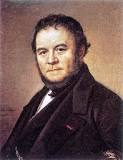The Red and the Black Page #13
Le Rouge et le Noir is a historical psychological novel in two volumes by Stendhal, published in 1830. It chronicles the attempts of a provincial young man to rise socially beyond his modest upbringing through a combination of talent, hard work, deception, and hypocrisy.
M. de Rênal quoted quite a large number of alleged verses from Horace. He explained to his children who Horace was, but the admiring children, scarcely attended to what he was saying: they were looking at Julien. The servants were still at the door. Julien thought that he ought to prolong the test--"M. Stanislas-Xavier also," he said to the youngest of the children, "must give me a passage from the holy book." Little Stanislas, who was quite flattered, read indifferently the first word of a verse, and Julien said the whole page. To put the finishing touch on M. de Rênal's triumph, M. Valenod, the owner of the fine Norman horses, and M. Charcot de Maugiron, the sub-prefect of the district came in when Julien was reciting. This scene earned for Julien the title of Monsieur; even the servants did not dare to refuse it to him. That evening all Verrières flocked to M. de Rênal's to see the prodigy. Julien answered everybody in a gloomy manner and kept his own distance. His fame spread so rapidly in the town that a few hours afterwards M. de Rênal, fearing that he would be taken away by somebody else, proposed to that he should sign an engagement for two years. "No, Monsieur," Julien answered coldly, "if you wished to dismiss me, I should have to go. An engagement which binds me without involving you in any obligation is not an equal one and I refuse it." Julien played his cards so well, that in less than a month of his arrival at the house, M. de Rênal himself respected him. As the curé had quarrelled with both M. de Rênal and M. Valenod, there was no one who could betray Julien's old passion for Napoleon. He always spoke of Napoleon with abhorrence. CHAPTER VII THE ELECTIVE AFFINITIES They only manage to touch the heart by wounding it.--A Modern. The children adored him, but he did not like them in the least. His thoughts were elsewhere. But nothing which the little brats ever did made him lose his patience. Cold, just and impassive, and none the less liked, inasmuch his arrival had more or less driven ennui out of the house, he was a good tutor. As for himself, he felt nothing but hate and abhorrence for that good society into which he had been admitted; admitted, it is true at the bottom of the table, a circumstance which perhaps explained his hate and his abhorrence. There were certain 'full-dress' dinners at which he was scarcely able to control his hate for everything that surrounded him. One St. Louis feast day in particular, when M. Valenod was monopolizing the conversation of M. de Rênal, Julien was on the point of betraying himself. He escaped into the garden on the pretext of finding the children. "What praise of honesty," he exclaimed. "One would say that was the only virtue, and yet think how they respect and grovel before a man who has almost doubled and trebled his fortune since he has administered the poor fund. I would bet anything that he makes a profit even out of the monies which are intended for the foundlings of these poor creatures whose misery is even more sacred than that of others. Oh, Monsters! Monsters! And I too, am a kind of foundling, hated as I am by my father, my brothers, and all my family." Some days before the feast of St. Louis, when Julien was taking a solitary walk and reciting his breviary in the little wood called the Belvedere, which dominates the Cours de la Fidélité, he had endeavoured in vain to avoid his two brothers whom he saw coming along in the distance by a lonely path. The jealousy of these coarse workmen had been provoked to such a pitch by their brother's fine black suit, by his air of extreme respectability, and by the sincere contempt which he had for them, that they had beaten him until he had fainted and was bleeding all over. Madame de Rênal, who was taking a walk with M. de Rênal and the sub-prefect, happened to arrive in the little wood. She saw Julien lying on the ground and thought that he was dead. She was so overcome that she made M. Valenod jealous. His alarm was premature. Julien found Madame de Rênal very pretty, but he hated her on account of her beauty, for that had been the first danger which had almost stopped his career. He talked to her as little as possible, in order to make her forget the transport which had induced him to kiss her hand on the first day. Madame de Rênal's housemaid, Elisa, had lost no time in falling in love with the young tutor. She often talked about him to her mistress. Elisa's love had earned for Julien the hatred of one of the men-servants. One day he heard the man saying to Elisa, "You haven't a word for me now that this dirty tutor has entered the household." The insult was undeserved, but Julien with the instinctive vanity of a pretty boy redoubled his care of his personal appearance. M. Valenod's hate also increased. He said publicly, that it was not becoming for a young abbé to be such a fop. Madame de Rênal observed that Julien talked more frequently than usual to Mademoiselle Elisa. She learnt that the reason of these interviews was the poverty of Julien's extremely small wardrobe. He had so little linen that he was obliged to have it very frequently washed outside the house, and it was in these little matters that Elisa was useful to him. Madame de Rênal was touched by this extreme poverty which she had never suspected before. She was anxious to make him presents, but she did not dare to do so. This inner conflict was the first painful emotion that Julien had caused her. Till then Julien's name had been synonymous with a pure and quite intellectual joy. Tormented by the idea of Julien's poverty, Madame de Rênal spoke to her husband about giving him some linen for a present. "What nonsense," he answered, "the very idea of giving presents to a man with whom we are perfectly satisfied and who is a good servant. It will only be if he is remiss that we shall have to stimulate his zeal." Madame de Rênal felt humiliated by this way of looking at things, though she would never have noticed it in the days before Julien's arrival. She never looked at the young abbé's attire, with its combination of simplicity and absolute cleanliness, without saying to herself, "The poor boy, how can he manage?" Little by little, instead of being shocked by all Julien's deficiencies, she pitied him for them. Madame de Rênal was one of those provincial women whom one is apt to take for fools during the first fortnight of acquaintanceship. She had no experience of the world and never bothered to keep up the conversation. Nature had given her a refined and fastidious soul, while that instinct for happiness which is innate in all human beings caused her, as a rule, to pay no attention to the acts of the coarse persons in whose midst chance had thrown her. If she had received the slightest education, she would have been noticeable for the spontaneity and vivacity of her mind, but being an heiress, she had been brought up in a Convent of Nuns, who were passionate devotees of the Sacred Heart of Jesus and animated by a violent hate for the French as being the enemies of the Jesuits. Madame de Rênal had had enough sense to forget quickly all the nonsense which she had learned at the convent, but had substituted nothing for it, and in the long run knew nothing. The flatteries which had been lavished on her when still a child, by reason of the great fortune of which she was the heiress, and a decided tendency to passionate devotion, had given her quite an inner life of her own. In spite of her pose of perfect affability and her elimination of her individual will which was cited as a model example by all the husbands in Verrières and which made M. de Rênal feel very proud, the moods of her mind were usually dictated by a spirit of the most haughty discontent.
Translation
Translate and read this book in other languages:
Select another language:
- - Select -
- 简体中文 (Chinese - Simplified)
- 繁體中文 (Chinese - Traditional)
- Español (Spanish)
- Esperanto (Esperanto)
- 日本語 (Japanese)
- Português (Portuguese)
- Deutsch (German)
- العربية (Arabic)
- Français (French)
- Русский (Russian)
- ಕನ್ನಡ (Kannada)
- 한국어 (Korean)
- עברית (Hebrew)
- Gaeilge (Irish)
- Українська (Ukrainian)
- اردو (Urdu)
- Magyar (Hungarian)
- मानक हिन्दी (Hindi)
- Indonesia (Indonesian)
- Italiano (Italian)
- தமிழ் (Tamil)
- Türkçe (Turkish)
- తెలుగు (Telugu)
- ภาษาไทย (Thai)
- Tiếng Việt (Vietnamese)
- Čeština (Czech)
- Polski (Polish)
- Bahasa Indonesia (Indonesian)
- Românește (Romanian)
- Nederlands (Dutch)
- Ελληνικά (Greek)
- Latinum (Latin)
- Svenska (Swedish)
- Dansk (Danish)
- Suomi (Finnish)
- فارسی (Persian)
- ייִדיש (Yiddish)
- հայերեն (Armenian)
- Norsk (Norwegian)
- English (English)
Citation
Use the citation below to add this book to your bibliography:
Style:MLAChicagoAPA
"The Red and the Black Books." Literature.com. STANDS4 LLC, 2025. Web. 10 Mar. 2025. <https://www.literature.com/book/the_red_and_the_black_201>.








Discuss this The Red and the Black book with the community:
Report Comment
We're doing our best to make sure our content is useful, accurate and safe.
If by any chance you spot an inappropriate comment while navigating through our website please use this form to let us know, and we'll take care of it shortly.
Attachment
You need to be logged in to favorite.
Log In